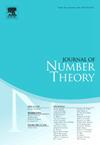Some computational results on a conjecture of de Polignac about numbers of the form p + 2k
IF 0.6
3区 数学
Q3 MATHEMATICS
引用次数: 0
Abstract
Let be the set of positive odd numbers that can not be written in the form . Recently, by analyzing possible prime divisors of b, Chen proved and if an arithmetic progression is in , with if and only if , where is the number of distinct prime divisors of n. In this paper, we take a computational approach to prove and provide all possible values of a if is in . Moreover, we explicitly construct nontrivial arithmetic progressions in with , 9, 10, or 11, and provide potential nontrivial arithmetic progressions in such that for any fixed . Furthermore, we improve the upper bound estimate of numbers of the form by Habsieger and Roblot in 2006 to 0.490341088858244 by enhancing their algorithm and employing GPU computation.
德-波利尼亚克关于 p + 2k 形式数的猜想的一些计算结果
设 U 是不能写成 p+2k 形式的正奇数的集合。最近,Chen 通过分析 b 的可能素除数,证明了如果算术级数 a(modb) 在 U 中,则 b≥11184810 且 ω(b)≥7,当且仅当 b=11184810 时,ω(b)=7,其中 ω(n) 是 n 的不同素除数的个数。本文采用计算方法证明 b≥11184810,并提供了 a(mod11184810) 在 U 中时 a 的所有可能值。此外,我们明确地构造了 U 中 ω(b)=8, 9, 10 或 11 的非微不足道的算术级数 a(modb),并提供了 U 中潜在的非微不足道的算术级数 a(modb),使得任何固定的 s≥12 时,ω(b)=s。此外,我们通过增强算法和使用 GPU 计算,将哈布西格和罗布洛 2006 年对 p+2k 形式数的估计上限提高到了 0.490341088858244。
本文章由计算机程序翻译,如有差异,请以英文原文为准。
求助全文
约1分钟内获得全文
求助全文
来源期刊

Journal of Number Theory
数学-数学
CiteScore
1.30
自引率
14.30%
发文量
122
审稿时长
16 weeks
期刊介绍:
The Journal of Number Theory (JNT) features selected research articles that represent the broad spectrum of interest in contemporary number theory and allied areas. A valuable resource for mathematicians, the journal provides an international forum for the publication of original research in this field.
The Journal of Number Theory is encouraging submissions of quality, long articles where most or all of the technical details are included. The journal now considers and welcomes also papers in Computational Number Theory.
Starting in May 2019, JNT will have a new format with 3 sections:
JNT Prime targets (possibly very long with complete proofs) high impact papers. Articles published in this section will be granted 1 year promotional open access.
JNT General Section is for shorter papers. We particularly encourage submission from junior researchers. Every attempt will be made to expedite the review process for such submissions.
Computational JNT . This section aims to provide a forum to disseminate contributions which make significant use of computer calculations to derive novel number theoretic results. There will be an online repository where supplementary codes and data can be stored.
 求助内容:
求助内容: 应助结果提醒方式:
应助结果提醒方式:


